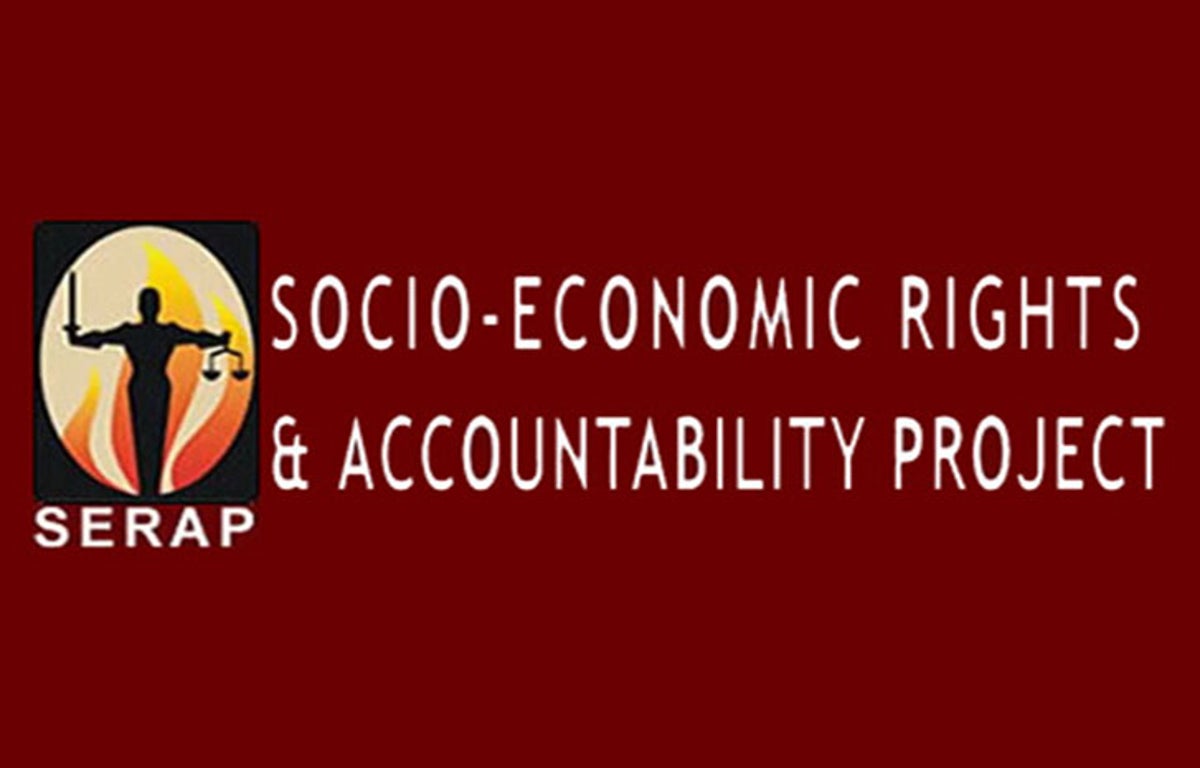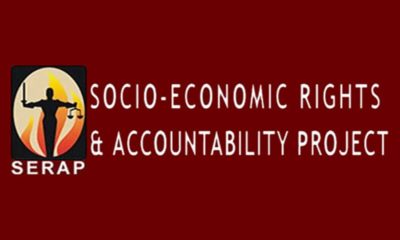Politics
Court Orders INEC To Hold States’ CSOs, Others To Account Over 2023 Election Violence

The Federal High Court sitting in Abuja, in a groundbreaking judgment, has ordered the Independent National Electoral Commission (INEC) to hold Nigeria’s state governors, their deputies and others to account over cases of electoral violence, bribery, vote-buying, and conspiracy during the chaotic 2023 general elections.
The judgment was delivered last Thursday by Hon. Justice Obiora Atuegwu Egwuatu following a mandamus lawsuit number: FHC/ABJ/CS/583/2023, brought by the Socio-Economic Rights and Accountability Project (SERAP).
The court ordered INEC to ensure “the appointment of independent counsel to investigate cases of electoral violence and other electoral offences against state governors and their deputies during the 2023 general elections.”
The court also ordered INEC to “to promptly, thoroughly and effectively investigate cases of electoral violence and other electoral offences committed during the 2023 general elections and to identify suspected perpetrators and their sponsors and ensure their effective prosecution.”
READ ALSO: SERAP Drags CBN On N100bn Dirty Notes, Other Missing Public Funds
Justice Egwuatu also ordered INEC “to swiftly prosecute all arrested offenders in the 2023 general elections in the custody of the Nigeria Police Force, Economic and Financial Crimes Commission (EFCC) Independent Corrupt Practices and Other Related Offences Commission and other law enforcement agencies.”
In his judgment, Justice Egwuatu held that, “I have compassionately evaluated the depositions in the affidavit of SERAP and I have no reason not to believe the depositions more so when there are documentary evidence in support of the depositions.”
Justice Egwuatu also stated that, “In the circumstances therefore, I find merit in the application. The sole issue of whether this Court ought to grant the relief of judicial review and orders of mandamus is resolved in favour of SERAP. Accordingly, I grant the prayers sought.”
Justice Egwuatu’s judgment, dated 18 July, 2024, read in part: “Being citizens of this great country, SERAP and its members have the legal interest whose enjoyment or enforcement directly or substantially depends on the performance of public duty by INEC.
“In requesting the performance of the public duty imposed on the electoral body, SERAP has demonstrated a great zeal of patriotism.
“The substance of SERAP’s grouse is the violence associated with elections in Nigeria which tends to prevent citizens from exercising their franchise during elections, thus preventing credible election and in the long run credible leaders.
“There is no gainsaying the fact that electoral violence and the associated crimes committed during elections in Nigeria is a great bane to the development of this country both democratically and economically.
“SERAP has also shown vide exhibit A8, a letter addressed to INEC requesting amongst other things the appointment of independent counsel to investigate allegations of electoral offences, including bribery, conspiracy, and undue influence against state governors and their deputies during the 2023 general elections.
“Exhibit A8 is thus a distinct and clear demand for the performance of the duty made by SERAP. The electoral body till the date of filing the action failed to, refused and or neglected to carry out or perform the duty requested by SERAP.
“There is no doubt that the Electoral Act 2022 creates some electoral offences. Sections 123, 124, 125, 126 127, 128 and 129 are some of the provisions of the Electoral Act that created some specific electoral offences.
“Trial of offences created by the Electoral Act are done in a Magistrate Court or a High Court of a State in which the offence is committed, or the Federal Capital Territory, Abuja. See Section 145(1) of the Electoral Act.
“By section 145(2) of the same Act, prosecution for the offences shall be undertaken by legal officers of INEC or any legal practitioner appointed by INEC. Clearly therefore, the law imposes on INEC the performance of a public duty.
“Section 24(d) and (e) of the Nigerian Constitution 1999 [as amended] recognizes the rights of citizens to take steps towards advancing the community where he resides.
“The section provides that ‘it shall be the duty of every citizen to-(d) make positive and useful contribution to the advancement of progress and well-being of the community where he resides; (e) render assistance to appropriate and lawful agencies in the maintenance of law and order.
“By the provision of order 34 of the Federal High Court (Civil Procedure) Rules, 2019, this court is empowered to grant an order of mandamus, prohibition or certiorari in the manner set out in the order.
“On an application for judicial review, any relief mentioned in rule 1 of order 34 may be claimed as an alternative or in addition to any other relief so mentioned if it arises out of, relates to or is connected with the same matter.
“An order mandamus lies to compel the performance of a public duty at the instance of a person who has sufficient legal interest in the performance of that public duty.
“Where a public duty is imposed on a public or government body, authority, department or official and the authority, department or official refuses or fails to perform that duty, an order of mandamus would issue to compel that body, authority, department or official to carry out that duty in respect of a person whose interest is directly and substantially affected by the refusal or failure to perform that duty.
“I must say that the entirety of the facts deposed to by SERAP were not controverted by INEC. It is trite that depositions in affidavit on material facts resolve applications in court. Where depositions on material facts in an affidavit in support of an application are not denied by the adverse party filing a counter-affidavit, such facts not denied in the affidavit in support remain correct position and the court acts on them except they are moonshine.
“While it is generally well settled that unopposed averments in an affidavit will be deemed admitted, it is also trite that the court has a duty to evaluate the unopposed averments and determine whether, as they stand, they justify the grant of the reliefs sought.
“The mere fact that the averments are not denied does not mean that the court must accept them without more. The averments, even if accepted by the court must be cogent and credible. If the court is not so satisfied, the application will be refused.”
The deputy director, SERAP, Kolawole Oluwadare said, “This ground-breaking judgment is an important milestone for Nigerians’ right to free and fair elections, and for victims of electoral offences in their search for justice, truth and reparations for the crimes which took place during the 2023 general elections.
“Justice Egwuatu’s judgment now provides a binding precedent for INEC to immediately pursue justice for those who suffered egregious abuses in Nigeria’s 2023 general elections. We commend Justice Egwuatu for his wisdom and courage, and his landmark decision.
“Respecting and implementing Justice Egwuatu’s judgment is imperative for protecting the rights of Nigerians to a free and fair election and reinforcing the primacy of the Nigerian Constitution, Electoral Act and the country’s international obligations.
“We urge INEC to immediately obey the court orders. The effective enforcement of Justice Egwuatu’s judgment will break with decades of impunity for electoral offences in Nigeria.”
In the letter dated 20 July 2024 sent to Chairman, INEC, Prof Mahmood Yakubu, on the judgment, and signed by Oluwadare, the organization said, “We urge you to demonstrate your expressed commitment to the rule of law by immediately obeying and respecting the judgment of the Court.”
The SERAP’s letter, read in part, “We urge you to approach the Chief Justice of the Federation as required under section 52 of the Independent Corrupt Practices and Other Related Offences Act for the authorization of an independent counsel to investigate cases of electoral offences against governors and their deputies during the 2023 general elections, as ordered by the court.
“We also urge you to work closely with the Nigeria Police Force, Economic and Financial Crimes Commission (EFCC) Independent Corrupt Practices and Other Related Offences Commission and other law enforcement agencies to prosecute the perpetrators and sponsors of electoral offences during the 2023 general elections, as ordered by the court.
“The immediate enforcement and implementation of the judgment by INEC will be a victory for the rule of law, fair, representative and violent-free elections in Nigeria. It would also advance Nigerians’ right to freely participate in their own government.
“By immediately complying with the judgment, you will show Nigerians that the electoral body is willing and able to end many years of brazen impunity for electoral offences in the country.
“Immediately implementing the judgment will restore public trust and confidence in Nigeria’s electoral process. It will also ensure compliance with constitutional provisions, international standards and the Electoral Act.
“SERAP trusts that you will see compliance with this judgment as a central aspect of electoral reform, and an important opportunity for INEC to assert its independence and authority. We therefore look forward to your positive response and action on the judgment.”
Nigeria has a history of flawed elections marred by electoral violence, bribery, vote-buying, undue influence and other grave electoral offences.
The SERAP filed the suit against the INEC to compel the electoral body to perform its constitutional and statutory duties to ensure the prosecution of suspected perpetrators of electoral offences and their sponsors during the 2023 elections.
Politics
Edo Women Protest Against Natasha Over Akpabio
Party loyalty and personal leanings on the political gbas-gbos rocking the Nigerian Senate have echoed in Edo State with women groups moving publicly against Senator Natasha Akpoti-Uduaghan.
These turn of events, which appeared to have the blessing of the Edo State Government was detailed in a government house statement in Benin City, under the signature of the Chief Press Secretary to the Governor, Fred Itua.
According to the statement, the All Progressives Congress (APC) Senatorial Woman Leader for Edo South, Hon. Barr. Itohan Osahon, led protest demanding that Sen Akpoti-Uduaghan should apologise to Senate President Godswill Akpabio.
ALSO READ: Reps Approve Tinubu’s Tax Reform Bills, Senate To Follow
Itua made clear on which side the Edo State was standing, when the Secretary to the State Government, Barr. Musa Ikhilor, received the pro-Akpabio demonstrators, on behalf of the governor, Senator Monday Okpebholo.
He cited the President, Senior Citizens of Edo State, Rosemary Elawure, as having made it clear that the women embarked on the peaceful protest in support of Senate President Godswill Akpabio.
The statement reads, “A group of concerned women from Edo State has called on Senator representing Kogi Central, Natasha Akpoti-Uduaghan to humble herself and apologize to Senate President Godswill Akpabio and Nigerians for dragging the name of the nation in the mud.
The women gave the charge during a peaceful protest to the Edo State Government House.
Led by the All Progressives Congress (APC) Senatorial Woman Leader for Edo South, Hon. Barr. Itohan Osahon, the women were received by the Secretary to the State Government, Barr. Musa Ikhilor on behalf of the governor, Senator Monday Okpebholo who was out of the State on an official assignment.
Speaking, Osahon said: “We are concerned women of Edo State and we are not comfortable with what is going on at the red chamber. Natasha is not the only woman in the Senate and the Senate is not about sexual harassment.
“She was suspended because she violated the rules of the Senate and she is manipulating the whole issue against the Senate President, Sen. Godswill Akpabio. Senator Natasha has been suspended for six months for disobeying the Senate Rules, not for sexual harassment.
“We don’t want her to abuse the opportunity given to her to serve her people. Our First Lady was once a senator and was there for years and such issue was not experienced. We have had many women in the Senate and House of Representatives and we have not had issues like this.
“Traveling all around the world, disgracing the country, making us the laughing stock and making a whole lot of noise about the issue. She should just apologize to the Senate. Edo State women are women who respect tradition and respect our men. She should not drag us to the mud.
“Our demand is that Natasha should be called to order and sentiments should not come to play and she should respect the rules of the Senate.”
The President, Senior Citizens of Edo State, Mrs. Rosemary Elawure said the women embarked on the peaceful protest in support of Senate President Godswill Akpabio.
She said Sen. Natasha lied against Senator Akpabio and that she was not the only senator whose seat was changed in the red chambers.
“Senior citizens don’t support things that will not bring progress and development to the country. Edo women are in support of the Senate President who has a very beautiful and intelligent wife who is humble and respectful. We urge Senator Natasha to be respectful and obey the rules of the Senate,” she counselled.
The women asked her to apologize to the Senate, House of Representatives as well as State Houses of Assembly in the country.
Receiving the women, Barr. Ikhilor commended them for a peaceful protest and expressing themselves freely, noting that women are very big stakeholders in Edo State.
He noted that the National Assembly is for all Nigerians and thanked the women for adding their voices to the issues concerning Sen. Natasha and the President of the Senate.
“You are here to make a very strong point regarding what is going on as it is now disturbing. It is wrong for facts to be distorted and manipulated. Nigerians are beginning to become conscious.
“Nigerians are aware of what happened in the Senate. The issue is all about the rules and regulations and anyone who disobeys them should face the consequences. Women are fighting for bigger issues facing them and Sen. Natasha can’t serve as the stumbling block stopping women from progressing.
“Sen. Akpabio has made a distinguished career in public service and we have confidence in him and his ability to manage the red chamber. The Senate is not a place for content creation and distractions but for serious minded people. Information should not be manipulated or distorted as Nigerians know what is happening in the Senate and can’t be deceived again.
“The governor is a senator and knows what happened in the chamber. He has confidence in the Senate President Godswill Akpabio. He will carry this message to different levels as we all have to protect our institutions.”
Politics
Reps Approve Tinubu’s Tax Reform Bills, Senate To Follow

The House of Representatives has adopted the report on the four tax reform bills of the President Bola Ahmend Tinubu administration.
The house made the adoption on Thursday at plenary in Abuja.
Having scaled the lower house, the tax reform bills now await the endorsement of the Senate.
ALSO READ: Economic Reforms Aim To Protect Nigeria’s Future – Tinubu
Notably, the adopted bills include the Nigerian Tax Bill, the Tax Administration Bill, the Revenue Tax Board Bill, and the Nigerian Revenue Service Establishment Bill.
The chairman of the House of Representatives Committee on Finance, Hon James Abiodun Faleke, said, “These bills underwent three full days of public hearings, with input from over 80 key stakeholders. Afterwards, we held an eight-day retreat to debate each clause.”
He assured Nigerians that the tax reform bills would produce widely acceptable laws.
“I am glad that House members recognised our thorough work and approved all our recommendations,” Faleke said.
He thanked fellow lawmakers and the House leadership for entrusting his committee with processing the tax bills and presenting them for consideration.
He commended President Tinubu for prioritising tax law reforms, noting that some existing tax laws date back to 1959.
“We cannot continue using outdated tax laws that no longer meet our business, survival, and revenue needs,” he stressed.
On his part, the Deputy Committee Chairman, Hon Saidu Abdullahi (APC-Niger), noted that no bill in the 10th Assembly had generated as much debate as the tax reform bills.
He praised Speaker Tajudeen Abbas for fostering consensus among stakeholders, ensuring broad-based input into the legislative process.
Hon Abdullahi highlighted that representatives from all geopolitical zones and regional thought leaders were involved, easing public concerns.
“The committee’s recommendations reflect the contributions of various stakeholders.
“These were never seen as perfect documents. The Executive made proposals, and the public hearing allowed Nigerians to refine them. Lawmakers have now endorsed the final version,” he added.
In the same vein, Hon Ikeagwuonu Ugochinyere (PDP-Imo) described the process as transparent, with consultants and the Executive making adjustments to reflect public interest.
“In spite of being in the opposition, we are proud of this historic moment. It will expand the tax net and increase government revenue.
“This reform will enhance tax collection efficiency while protecting small businesses. That is why we worked together to ensure its passage,” Hon Ugochinyere said.
In the views of Hon Benson Babajimi (APC-Lagos), all stakeholder concerns, including inheritance tax, derivation, and VAT, were carefully considered.
“This is a great day for Nigeria. The House has approved the necessary reforms, and we now await Senate concurrence,” he said.
Politics
Edo Govt Accuses PDP Of Backing Kidnappers

The ragging battle for the soul of Edo State between the All Progressives Congress (APC) and the Peoples Democratic Party (PDP) has taken a dramatic turn, with the APC-run government accusing the PDP leadership of being the brain behind the menace of kidnapping ravaging the state.
The Chief Press Secretary to the Governor, Fred Itua, in a statement in Benin City on Tuesday averred that intelligence reports indicate the involvement of PDP leaders in recent kidnappings and violent crimes across the state.
He posited that the opposition PDP was sponsoring insecurity in Edo State as part of calculated efforts to undermine the administration of Governor Monday Okpebholo.
ALSO READ: Under Tinubu, Nigeria Is Moving In Right Direction
Itua described the PDP’s outcry over insecurity as “crocodile tears,” accusing them of deliberately orchestrating chaos while pretending to be concerned about public safety.
According to Itua, “The sudden concern expressed by PDP leaders is nothing but a smokescreen to divert attention from their own complicity. These are the same individuals who, during the 2024 governorship election, armed non-state actors with dangerous weapons, many of which were never recovered. Today, those weapons are in the hands of criminals terrorizing innocent Edo citizens.”
He added that the PDP’s strategy was to create an atmosphere of fear, spread misinformation, and discredit the current administration.
“Their goal is clear — destabilize the state, weaken public confidence in Governor Okpebholo’s leadership, and push a false narrative of failure. But Edo people can see through these antics,” Itua stated.
He revealed that the state government has called on security agencies, including the Nigeria Police, to launch a thorough investigation into the alleged involvement of PDP leaders in the rising wave of kidnappings and armed violence.
“No individual or political group should be allowed to hold the state hostage for political gain. Those found culpable must face the full wrath of the law,” he added.
Gov Okpebholo’s administration reaffirmed its commitment to tackling insecurity and ensuring the protection of lives and property. The government urged Edo residents to remain vigilant and not fall for what it described as the PDP’s “deceptive tactics.”
Itua pointed out that “Insecurity thrives when its perpetrators believe they are untouchable. It is time for security agencies to prove them wrong.”



















먹튀검증
July 22, 2024 at 6:57 pm
빠르고 안전한 먹튀검증으로 먹튀 피해를 예방하세요. 먹튀검증 전문 커뮤니티 먹튀감정사에서 먹튀 없는 안전놀이터 정보를 제공합니다.